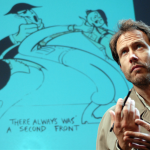 No End to Blame: Scenes of Overcoming
No End to Blame: Scenes of Overcoming
PTP/NYC [Potomac Theatre Project]
Atlantic Stage 2
Written by Howard Baker
Directed by Richard Romagnoli
Production website
💉💉💉💉 out of 5.
God it is great to see a good play with actors that work WITH each other and CARE, CARE, CARE about what they are saying. No End to Blame is that play. After a string of weak plays, I was thrilled. I kicked off my shoes, curled up in my seat, and “willingly suspended my disbelief.”Howard Barker’s No End of Blame: Scenes of Overcoming explores the role of the artist in society and the struggle against censorship This HARSH play begins in the midst of a war with an attempted rape and a near execution during WWI, the protagonist is the brilliant Hungarian political cartoonist Bela Veracek (loosely based on the German cartoonist Victor Weisz). Running from Hungary at the end of the First World War to the newly forming Soviet Union and then to a pre-WWII Britain, Bela is constantly at odds with the governments he lampoons, and the newspapers that admire his talent.
It is a political play – -but I never felt preached at. It was a dense story line going to many places with a small group of actors playing a plethora of characters – – but I was never confused. It dealt with the struggle of art that you hang on the wall and art that inflames you when you read the political section of the newspaper – – but I never felt like I was being lectured.
These actors were good – damn good. My only reservation with the play – (and I am still unsure if I like it or hate it) is that in the early scenes when the characters are all from the same place they use a standard American dialect. But when characters come from different worlds (i.e. Russia and England) they take on a dialect. It took me awhile to understand the conceit, but it didn’t really get in my way.
Alex Draper as Bela (the cartoonist) is first rate. I could just sit and watch him silently respond to the play around him over and over again. He was so present – so connected I gave up critiquing the evening and just surrendered to his story telling. I wish I could tell you some of the beautiful passages and clever insights in the play – but I got lost in the story – in the best possible way -lost in the story.
“Give us a pencil. . .Somebody. . .Give us a pencil.” – Bela in “No End of Blame”
